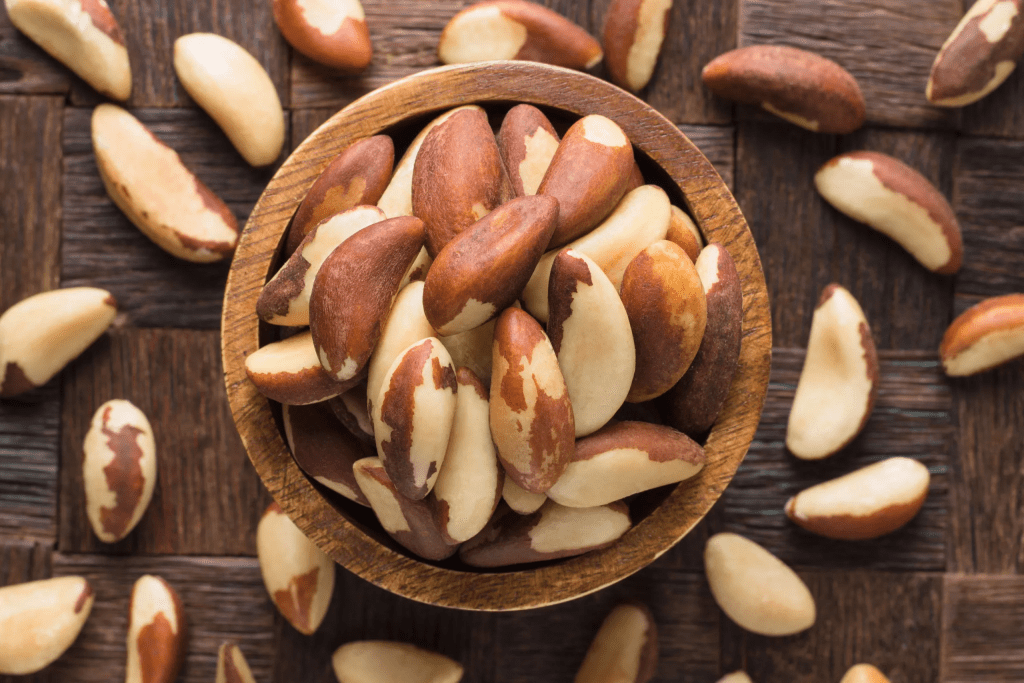7 Foods That Science Shows Improve Your Mood

There’s plenty of evidence that activities like exercise, spending time outside during the day and cuddling with your pet can lift your spirits, and it turns out that what you eat can also have a big impact on your mood. Whether you’re tormented by the winter blues or find yourself with a fear you can’t seem to shake, the food you put in your shopping cart and on your dinner plate will help.
While there is no one food that can cure all ills, and you should certainly consult your doctor if you think you are experiencing depressive symptoms, there are several foods that have been scientifically proven to improve people’s sense of well-being. Some of these foods, such as Brazil nuts, contain compounds that stimulate the production of certain feel-good hormones, while others, such as coffee, can actually block compounds that might make you feel bad.
You may notice that many of the foods on this list are also considered superfoods and have a myriad of health benefits that go far beyond promoting a good mood. In other words, even if you don’t need help getting rid of the winter blues, these versatile foods should be on your radar. Read on to learn which foods will improve your mood, according to doctors and science.
1. Salmon And Albacore Tuna

Fatty fish like salmon and tuna are rich in omega-3 fatty acids, which are good for your heart and brain. “The abundance of omega-3 fatty acids in fish such as salmon and albacore tuna may help improve mood and reduce depression through the effects of omega-3 fats as anti-inflammatory signaling molecules and their structural role in the brain,” explains Casey Means, M.D., a Stanford-trained physician and associate editor of the International Journal of Disease Reversal and Prevention. “It’s important to remember that 60 percent of our brain tissue is made up of fat, so the fats we choose in our diet have a big impact on both the structure and function of our brains.”
Two specific omega-3s – docosahexaenoic acid (DHA) and eicosapentaenoic acid (EPA) – have been linked to lower levels of depression. According to a 2016 review of scientific data, DHA and EPA help regulate brain cell signaling mechanisms, including dopaminergic and serotonergic pathways. In other words, they can boost your mood. If you don’t like salmon or tuna, you can get omega-3 fatty acids from foods like flaxseed or tofu.
2. Dark Chocolate

Yes, a chocolate bar can really help improve your mood! “Studies have shown that consuming dark chocolate is associated with lower odds of clinically relevant depressive symptoms, with those who consumed the most dark chocolate being 57 percent less likely to develop depressive symptoms than those who did not consume dark chocolate,” says Dr. Means. “This may be related to the chemicals in dark chocolate called cocoa polyphenols, which are potent antioxidants that may improve inflammatory conditions. Chocolate also contains psychoactive ingredients that may produce positive feelings.”
However, when you’re shopping for mood-boosting chocolate, Dr. Means notes that cocoa content is key. “It’s best to choose the darkest chocolate you can find because it contains the least amount of sugar and the most cocoa mass (too much sugar and subsequent spikes and crashes can lead to emotional instability),” she explains. “I choose 85% or more and like organic brands like Alter Eco and Green & Black’s.”
3. Fermented Foods
In addition to supporting good gut health, fermented foods like sauerkraut, kefir and kimchi may also have a positive impact on your mood. These foods contain probiotics, which, according to numerous studies, may raise serotonin levels. This is especially important because serotonin – sometimes referred to as the “happy hormone” – is responsible for boosting your mood.
“The positive impact of fermented foods on mood may be related to the strong relationship between gut function and brain health, and there is a fascinating two-way relationship between the two,” shares Dr. Means. “One study showed that people who consumed the most probiotic foods were significantly less likely to suffer from depression and self-reported clinical depression. These effects were stronger in men.”
Dr. Means added, “There are several possible mechanisms that could explain why this is the case, including the effects of fermented foods on blood sugar control and metabolic health, which can affect mood and brain. In addition, fermented foods are rich in chemicals that are uniquely flavonoids – potentially positively affecting the microbiome to reduce inflammation and oxidative stress, both of which can negatively impact the brain.”
4. Brazil Nuts

“Brazil nuts are one of the most potent sources of selenium, which has multiple functional roles in the body, including the production of key immune and antioxidant proteins called selenoproteins, as well as healthy production of thyroid hormones,” says Dr. Methods. According to a 2021 study, high selenium intake was associated with a lower prevalence of depression, even after adjusting for several variables. The converse is also true, as selenium deficiency is common in people with depression.
“Healthy thyroid function is strongly associated with mood, as both hyperthyroidism and hypothyroidism can have a significant impact on mood,” Dr. Means continued. “Optimal antioxidant and immune function are fundamental to mood states by improving oxidative stress (to which the brain is very sensitive) and chronic inflammation, both of which can negatively affect the brain.”
5. Kale And Spinach
Ready to shake off those lingering winter blues? Eat your vegetables! According to Stacie J. Stephenson of CNS, a board member of the American Dietetic Association, dark leafy greens in particular (think kale, spinach and Swiss chard) are rich in B vitamins. According to the Mayo Clinic, these vitamins play a role in the production of brain chemicals that affect mood and other brain functions. In addition, low levels of B12 and other B vitamins, such as B6 and folic acid, may be associated with depression. If you don’t like dark leafy greens, you can get your vitamin B fix by eating foods like bananas and eggs.
6. Coffee

Although it may seem counterintuitive, a cup of coffee can help you get rid of your fears. While caffeine may make some people feel nervous or anxious, it also prevents a natural compound called adenosine from attaching to the brain receptors that cause fatigue. This, in turn, increases alertness and focus, which can have a positive effect on your mood.
Caffeine has also been scientifically proven to increase the release of mood-boosting neurotransmitters like dopamine and norepinephrine, but there is evidence that coffee’s mood-boosting properties go beyond that of a stimulant. In fact, a 2018 study of 72 adults found that both caffeinated and decaffeinated coffee significantly improved people’s moods compared to placebo drinks. This suggests that coffee may contain other compounds that also have a positive effect on mood.
7. Beans And Lentils
Stephenson points out that beans, legumes and other complex carbohydrates that are slowly absorbed by the body can reduce cravings for less healthy carbohydrates that often cause blood sugar fluctuations, which, as Dr. Means points out, can lead to depressed mood and irritability. These complex carbohydrates also provide microbiota-enhancing fiber and resistant starch, which help keep blood sugar stable and limit the potential for mood swings.
Need another reason to stock up on beans and lentils? These two foods are also good sources of tryptophan, which the body uses to make serotonin.